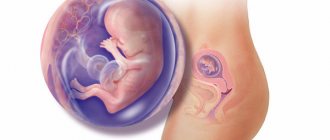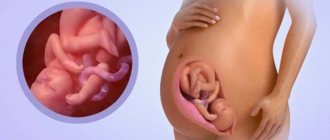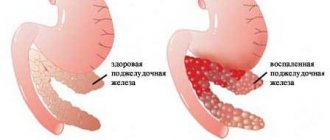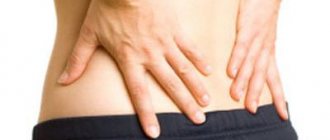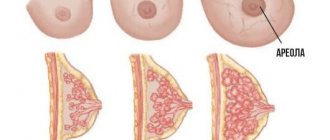Why can skin itching occur during pregnancy?
Itching during pregnancy may be normal.
It is explained by hormonal changes in the expectant mother, which make her body an ideal “incubator” for the fetus. Estrogens produced in the female body affect the functioning of all its systems. The skin becomes drier and more sensitive, it reacts sensitively to any irritants and at the very beginning of gestation it can itch for completely different reasons. As pregnancy progresses, discomfort may either increase or disappear completely. For all women, this happens differently: for some, the whole body itches, for others, the unpleasant sensations are localized in a specific place. Most often, pregnant women are bothered by discomfort in the abdomen, chest and perineum.
In the early stages
In the 1st trimester, the culprit of all the troubles of the expectant mother is toxicosis. Due to the fact that a lot of “garbage” is thrown into the blood, a woman experiences itching, which is most strongly felt in places where the epidermis is thinnest.
Another physiological reason that the skin itches is its dryness. This is normal as long as there are no rashes on it.
In the first months of bearing a baby, a common cause of itchy skin is increased sweating. Under the influence of hormones, a woman begins to sweat more than before. The skin is not used to this, so it reacts with irritation and itches where moisture accumulates: in the armpits, under the breasts, in the perineum, etc.
Itching in the abdomen and chest in pregnant women in the 1st trimester is explained by processes occurring inside the abdominal cavity and mammary glands. When a woman’s nipples and the skin around them begin to itch, her breasts are preparing for the start of lactation.
In the later stages
The skin can also itch in the later stages of pregnancy (for more details, see the article: the belly itches in the late stages of pregnancy). In the 3rd trimester, many expectant mothers complain of itching in the abdominal area and the appearance of stretch marks. Striae are often accompanied by very severe itching, causing discomfort to the woman.
The cause of unpleasant sensations in the last months of bearing a baby is often the weight the mother has gained. The epidermis stretches, not having time to adapt to the new body size, and itches.
In the 3rd trimester, the expectant mother sometimes begins to itch her body due to nervous tension. In this case, the itching is not very pronounced, but manifests itself to a greater extent when thoughts about the upcoming birth appear. Especially sensitive women who are very worried about how they will cope during one of the most difficult moments in life should definitely take soothing teas for pregnant women. As a rule, such products are good at relieving itching of various localizations.
While pregnant, women often experience itchy skin on their body. The unpleasant sensation intensifies at night, leading to severe nervousness and sleep disturbance in the pregnant woman. What does this condition mean, and how to treat it correctly?
Itching on the skin during pregnancy occurs at different times and differs in its intensity. It can occur from an insect bite or due to serious internal pathology. Such an alarming symptom should not be overlooked and at the first manifestations, immediately consult a doctor.
We suggest you familiarize yourself with Polygynax or clotrimazole, which is better?
Probable Causes
Most often, women complain that their skin in the abdomen and chest area is very itchy. The causes of this condition are pathological, psychological and physiological factors. Let's look at each of them in more detail.
Pathological
This group of provoking factors includes:
- response to an allergen. There are food and household allergic reactions. In the first case, the pregnant woman develops rashes on the skin that are very itchy. Thus, the body’s response to the entry of an external allergen (food product) into it is manifested. When using low-quality washing powders or cosmetics, a pregnant woman also experiences severe itching on the skin;
- heavy sweating. When a woman's hormonal levels change, the function of her sweat glands also changes. With insufficient personal hygiene, sweat begins to accumulate in the folds, which over time begin to itch;
- pathologies of the liver and biliary tract (the most common is cholestasis). It develops against the background of hormone surges in the body and manifests itself not only in the form of itching, but also redness of the skin;
- diabetes;
- hepatitis, which develops against the background of damage to liver cells.
Physiological
The main reason is stretching of the skin due to a strong increase in the abdomen. The itching begins to appear especially pronounced in the second trimester.
At this stage, there is a strong stretching of the connective tissue fibers of the skin, resulting in severe itching.
Psychological
Dermatosis is a characteristic disease for pregnant women, manifested against the background of severe toxicosis. Due to nervousness, a woman develops severe itching, which intensifies at night.
The pregnant woman becomes very irritable. With constant scratching, eczema and ulcers appear on the body.
The exact cause of such an unpleasant symptom can only be determined by the results of laboratory blood tests and instrumental studies.
If such a symptom is not accompanied by a rash on the body, then the woman should not worry. This occurs due to an increase in estrogen levels in the body. Skin itching stops after the baby is born. To relieve this unpleasant symptom, doctors prescribe external remedies to the woman.
When the first unpleasant symptom appears, you should consult a dermatologist. He will conduct an external examination and prescribe laboratory tests. Based on the results obtained, an individual treatment regimen is selected, based on the root cause of this condition.
Treatment
Therapeutic measures depend on the form of skin itching and the stage of pregnancy. In most cases, external medications are prescribed to help relieve discomfort.
In the early stages
In case of allergic itching in the early stages, a woman is recommended to exclude the effect of a potential allergen and take antihistamines. If the reason is hormonal changes, you just need to endure this period. To relieve an unpleasant symptom and prevent the development of unwanted complications, it is recommended to adhere to the rules of personal hygiene.
In the later stages
Itching in the second and third trimester, in most cases, is associated with severe stretching of the skin. To eliminate this unpleasant symptom, it is recommended to regularly lubricate the skin with a rich baby cream.
Applications made from decoctions of medicinal herbs (chamomile, calendula, etc.) are also considered effective. If the itching is caused by an insect bite, then you need to treat the desired area with a weak solution of baking soda.
If bile stagnates, you can take enterosorbent (activated carbon, etc.). Any other medications are prescribed by the attending physician. Self-medication entails the development of unwanted complications.
If you have liver dysfunction, you must adhere to a strict diet that excludes spicy, fried and fatty foods. If there are no contraindications, consume the maximum amount of liquid that helps eliminate toxins.
Delaying treatment poses a direct threat to the normal course of pregnancy.
Itching during pregnancy occurs quite often in women. It occurs against the background of hormonal changes in the body, psychological factors, allergies or internal pathology.
Dysfunction of the liver or gall bladder, which is accompanied by severe itching throughout the body, is considered particularly dangerous. An experienced specialist who selects an individual treatment regimen can determine the exact cause.
We suggest you read Acne on the body itches - looking for the causes of the rash
For prevention purposes, it is necessary to observe the rules of personal hygiene, exclude potential allergens from the diet and minimize nervous tension.
Normal or pathological?
Itching is normal when it is explained by hormonal changes, abdominal growth and the absence of serious abnormalities in tests. But there are cases when itching is considered to be a pathology, for example, with intrahepatic cholestasis of pregnancy. The disease is caused by an increased amount of progesterone. The pathology is dangerous for mother and child, who may die in the womb. If the diagnosis is made late, doctors recommend a cesarean section.
Itching of the skin in the early stages of pregnancy throughout the body
Itching and burning occur in 20% of women during pregnancy. Constant itching is dangerous due to possible infection. At the first sign, you should seek help from a doctor. The cause may be ordinary nervous strain or an infectious disease.
In the later stages
The most common complaint is itching in the navel area. This is explained by the fact that the skin does not keep up with the growth of the abdomen. This itching can be relieved with a moisturizer.
Itchy hands and feet
Due to the effects of hormones, there is constant dryness in the arms and legs. During the period of bearing a baby, immunity decreases, and previously sluggish diseases manifest themselves with new activity. If after work a woman felt tired in her legs, now when carrying a child, problems with her legs degenerate into venous diseases.
As blood volume increases, the load on the heart and veins increases. The enlargement and appearance of spider veins causes an itching sensation in the upper layers of the skin.
Severe itching all over the body without rashes
Constant surges of hormones, their changes and tension cause real discomfort. There are situations when, having scratched one part of the body, a woman may suffer from itching throughout the body. Everything can itch - from the gums, legs, stomach to face and shoulders.
Itchy skin during pregnancy: possible causes and treatment
During pregnancy, women often experience itchy skin. Itching can be localized in one place or spread throughout the body. There are many reasons for this, but you need to know how dangerous it is for the woman and the fetus. There are reasons of a safe nature and those that entail pathological changes.
Causes that are not included in the dangerous group:
- Large load on the liver. The liver enzymes ALT and AST reflect the real load on the pregnant woman’s liver. Their increase is called hepatosis or cholestasis of pregnancy, which occurs as a reaction of the body to bearing a fetus, taking vitamins and other medications.
- Hormonal surge. During this period, the body produces estrogen (female hormone) several times more than usual. As a result, the liver cannot cope with processing, which leads to the accumulation of bile. Then all these substances are distributed through the blood into the muscle fibers, irritating the nerve endings. The body begins to itch.
- Itching occurs due to drying and stretching of the skin. This is usually observed in women who are rapidly gaining weight. Therefore, doctors recommend strictly monitoring body weight during pregnancy. In this case, there is a slight itchy tingling sensation in the abdomen and lower back.
- Formation of stretch marks. Striae appear due to a lack of elastin and collagen and rapid weight gain.
- Increased sweating. Body moisture promotes the spread of pathogenic bacteria. It is important to maintain personal hygiene.
- Wearing synthetic and excessively tight underwear.
If your body is constantly itching, contact your supervising doctor immediately. Itching can be a sign of serious pathological abnormalities!
Ways to eliminate itching: ointments, creams and medical advice
When a doctor tells a patient that her discomfort is related to hormonal levels, not everyone understands what this means and how to deal with it. Then the woman is prescribed a test to determine the “raging” hormone, the results of which will allow you to choose the most effective remedy.
The following ointments may be prescribed:
- Lokoid - therapy for atopic dermatitis;
- Belosalik, Triderm, Afloderm - prescribed if the first drug turned out to be useless;
- Flucinar or Elokom - for the treatment of serious chronic pathologies.
These products will help relieve nighttime itching, so it is better to use them before bed. If the skin in the lower abdomen itches, stretch marks are the cause of the symptom.
In such cases, doctors prescribe the following products to smear the skin with:
- Biovergetures cream-gel from Biotherm;
- Creme de Corps Nourishing Dry Body Oil from Kiehl's;
- moisturizing milk Lipikar Lait from the La Roche-Posay brand.
It is important to understand that in addition to advice on how to cure an itchy symptom, you need to find out for yourself how to prevent it. As a preventative measure, you can use herbal decoctions, adding them to baths or doing a light massage of the legs to remove swelling and prevent burning of the skin.
Pathological processes accompanied by itching and associated symptoms
In most cases, mild itching during pregnancy is normal and goes away on its own. If the condition is accompanied by a skin rash, changes in body temperature and other signs, it is associated with some pathology. Pathological causes of itching in an expectant mother may be as follows:
- Cholestasis. This phenomenon occurs in pregnant women at different stages and is associated with hormones. During pregnancy, bile can become too thick, stagnate in the bile ducts and enter the blood. With cholestasis, the palms and feet itch first, then the discomfort spreads to the skin of the abdomen, shoulders and back. Urine becomes dark in color, feces become light. Sometimes there is yellowness of the mucous membranes and skin.
- Kidney diseases. When organs fail to remove metabolic products from the body, they accumulate under the skin and irritate it.
- Pancreatitis. When the activity of the pancreas is disrupted, the sugar entering the body is not completely processed; it accumulates in the vessels, causing irritation of the epidermis. Concomitant symptoms of pancreatitis may be dryness of the epidermis, pain in the left hypochondrium, nausea, and stool disorders.
- Parasites. Intestinal parasites often cause skin problems. Helminths, having settled in the intestines, regularly injure its walls. Through these damages, toxins enter the bloodstream, which normally should leave the intestines only naturally. Other parasites can also cause itchy skin. For example, the scabies mite causes itchy palms, wrists, and stomach. If the perineal area begins to itch, the possibility of infection with pubic lice cannot be ruled out. These insects can also bite other parts of the body, so lice are the reason why the whole body itches.
- Allergy. When any irritant enters the body, the skin can itch on any part of the body - arms, legs, stomach, face, back. Redness or hives usually appear on the itchy areas. Both external and internal factors can cause allergies in the expectant mother.
- Dermatological disorders. Pregnant women may develop skin diseases due to low immunity. Itchy skin is caused by disorders such as lichen, eczema, and fungal infections. In case of skin disorders, significant visual changes are noticeable on the surface of the epidermis.
- Infectious diseases. Many viral diseases are accompanied by rashes, often in the form of blisters that are very itchy. Similar pathologies include measles, rubella, herpes infection, and chickenpox.
We suggest you familiarize yourself with Streptocide for acne on the face, use
Causes
If a pregnant woman has an itchy stomach and chest, this is a completely natural process. Its causes are the enlargement of these parts of the body and the gradual stretching of the skin. In medicine it is called very menacingly - “polymorphic dermatosis of pregnancy,” although in fact it is one of the most harmless and natural causes of this phenomenon.
However, cases are different, and today doctors warn that itching can also be dictated by other factors that pose a potential threat to the mother and child. Therefore, you need to find out as quickly as possible what the origin of itchy skin during pregnancy is.
- It can be a symptom of such serious diseases as liver pathologies, cholecystitis, hepatitis, cholecystic pancreatitis. This condition is called cholestasis and requires immediate treatment. In these cases, skin itching can spread not only to the stomach and chest, but also to other parts of the body - arms, back, legs. The risk group includes those who, before pregnancy, had hepatitis A, cholelithiasis, chronic cholecystitis, are carrying several babies and are over 35 years old.
- If skin itching during pregnancy is accompanied by rashes reminiscent of an allergic reaction or teenage acne, the cause may be an allergy to cosmetics, clothing, food, dust, flowers, etc. Without eliminating the allergen from her life, a woman will not be able to get rid of the itching .
- One of the reasons is the increase in the amount of estrogen in the body of a pregnant woman: such hormonal changes are not scary for mother and baby: they will just have to endure severe itching, and after childbirth it will disappear.
- Skin diseases such as eczema or scabies cannot be excluded from the list of causes. In this case, itching and rash most often appear in skin folds - under the knees, on the bends of the elbows, under the arms, on the neck. In this case, you need to undergo treatment with a dermatologist.
- If severe burning and itching is felt in the genitals during pregnancy, these may be symptoms of bacterial vaginosis or thrush (read how to identify it here). It is recommended that they be treated before birth.
Since such serious and dangerous diseases can be the cause of this phenomenon, at the first symptoms a pregnant woman should definitely consult a doctor in order to protect herself and the baby from undesirable consequences. Timely treatment of itching will help avoid complications.
Why do pregnant women's bodies itch and how to get rid of the itching?
Discomfort caused by internal disease should only be treated in a hospital. Serious disorders of the liver, kidneys, and pancreas that cause itching of the body pose a clear threat to the health of the fetus, so treatment should be carried out under the strict supervision of a doctor.
If itching appears as a side effect of bearing a baby, you can use various methods to combat it. The main thing is that they cannot harm the child.
Doctors recommend relieving itchy skin with regular hygiene. Expectant mothers need a shower or bath at a comfortable water temperature. Under no circumstances should it be hot - this will increase the discomfort. It is advisable to use hypoallergenic products for washing. After taking a shower, it is useful to apply baby cream to your skin.
Many mothers who complain of itchy skin suffered from dermatological disorders even before pregnancy. They are accustomed to using certain medicinal ointments and creams for treatment. To make sure that the product will not harm the baby when used during gestation, you must first consult with a gynecologist.
Folk remedies
Many women for whom pharmaceutical ointments for itching are contraindicated are helped by traditional medicine recipes. All of them are safe for the expectant mother and quickly relieve skin irritation:
- Warm bath with a decoction of chamomile or string. To prepare it, you need to boil 100 g of herb in 3 liters of water, let the broth cool and pour it into the prepared bath. You should sit in this medicinal mixture for at least 15 minutes.
- Oatmeal compress. This procedure should be carried out with the addition of kefir or yogurt to the flakes. It is recommended to apply the compress for 20-30 minutes.
- Cabbage leaf. For itching, it is recommended to make lotions from cabbage leaves soaked in apple cider vinegar. If you need to relieve the itching sensation from an area where there are cracks, the application should be done without using vinegar. The cabbage leaf must be kneaded in your hands before use.
What causes abdominal itching?
To tell the truth, there are a lot of reasons for abdominal itching. We will try to sort out some of them now, perhaps someone who reads this article will find and understand the answer for themselves.
Allergy
As strange as it may sound, one of the reasons that a pregnant woman always feels the urge to scratch her belly is allergies. By the way, very often allergies appear during pregnancy in those women who never had it before pregnancy. And just as quickly as it appeared at the beginning of pregnancy, it disappears after delivery. This is due to the fact that nature has arranged it in such a way that when a new life is born in a woman’s body, her immune system decreases. This happens so that the female body cannot reject the life that has just arisen in it, which is for it “but not for the future mother!” stranger.
We recommend reading: At what stage does an ultrasound show pregnancy, Regidron during pregnancy, Magnesium during pregnancy
Let's take a simple example. Before pregnancy, the girl was, to put it mildly, cold to chocolates, but now she was acutely drawn to them. And she ate a whole kilogram at a time. Or at a birthday party, where a close friend invited her, she enjoyed the taste of half the cake. The body’s logical conclusion is that the stomach or other parts of the body are covered in a rash. This is how allergies appear.
We also recommend reading: Multiple pregnancy
And this is how the body can react to any food from the first day of pregnancy. And the itchy rash can appear on any part of the body. There is absolutely no need to worry about a new allergy, since after the natural end of pregnancy the woman’s body will return to its normal state and the allergy will disappear like a bad dream. And in order to minimize the consequences of allergies, it is necessary to monitor the foods you eat and their quality and quantity.
Super sensitive and dry skin
In pregnant women, the skin on the abdomen becomes more sensitive and therefore reacts to literally everything - synthetics, sweat, dust, touching clothing and other similar factors.
Even the slightest failure to comply with daily hygiene standards leads to skin irritation.
In order to cope with this, you don’t need to have special talents, you just need to follow the rules prescribed for pregnant women - stay in stuffy and dusty rooms as little as possible, clothes should only be made of natural material and in no case should be tight. Well, what any girl does every day without any instructions is taking a shower at the beginning and end of the day, using any suitable moisturizers - be it creams, lotions or ordinary vegetable oil, as you like.
The body's rejection of cosmetics
Sometimes it happens that in pursuit of beauty, a woman is ready to pay a lot of money, but this is of little, if not zero, use. It often happens that a pregnant woman buys an endlessly expensive cream for stretch marks, throwing a considerable amount of money on it, but it not only does not help, but also causes redness and itching of the skin. In this case, it is best to purchase olive oil; it works no worse, and sometimes even better, than many expensive creams, and at the same time it has no contraindications and does not contain any chemicals.
Is it possible to prevent itching during pregnancy?
Preventive measures that can prevent dermatological problems during pregnancy:
- Skin care. A clean, healthy epidermis reacts weaker to internal changes in the body and is less likely to be exposed to parasites.
- Proper nutrition. If the expectant mother eats only healthy foods, without being tempted by fried, salty, spicy or sweet foods, her internal organs will retain the ability to withstand stress that causes various disorders. In this case, there will be no problems with your skin, hair, or teeth.
- Moderate physical activity. This is extremely beneficial for the skin, as it increases its elasticity and resistance to external influences.
- Vitamin therapy. Since certain vitamins are needed for the health and beauty of the skin, expectant mothers should definitely take them. The doctor must decide what kind of drugs these will be.
- Calm. It is important for the expectant mother to avoid stress. The child and your own health should come first, everything else should come second. Learn to enjoy every day of pregnancy, love your changed body and the defenseless baby in the womb, talk to him, stroke him, sing songs to him, follow the doctors’ recommendations - and no problems with the skin will arise.
conclusions
The first thing pregnant women should do if they experience itching in the area of their growing belly is to calm down and try to eliminate the unpleasant symptoms on their own using the methods described in the article.
If the itching does not go away for more than a week, then you need to go to the antenatal clinic and solve the problem with your doctor. The main thing is not to worry and follow all the specialist’s recommendations. And we, for our part, wish all women to take care of themselves during this difficult period of bearing a child and, of course, an easy birth! Bye everyone!
Sincerely, Katherine Grimova, mother of a wonderful daughter!
What do pregnant women say?
Often allergic reactions are the cause of abdominal itching, according to reviews from pregnant women. Very often, expectant mothers cannot tolerate synthetic, woolen and other fabrics, and also react to cosmetics, even if they have used them for a long time without any consequences (do not forget that the hormonal background of a pregnant woman is constantly changing). Seafood and other delicacies pose a high risk of developing an allergic reaction.
Many women do nothing at all when their stomach itches during pregnancy. After some time, the itching goes away on its own. Even very strong intense itching can develop against the background of absolutely normal tests, reviews indicate.
In addition, in many cases, medical prescriptions can be avoided by adjusting the diet. So don't overload your liver.
Why can your stomach itch in early and late pregnancy?
I don’t know what comes first: to feel sorry for you or to calm you down. I’ll try everything at once: A LOT of expectant mothers have an itchy stomach at various stages of pregnancy. It can sometimes be simply unbearable to endure severe itching, but there is nowhere to go - you will have to suffer. However, this does not mean that you can do nothing when your stomach itches during pregnancy. Firstly, in some cases itching can be an alarming sign, and secondly, at least a little and for a short time, it is still possible to eliminate or reduce the itching.
